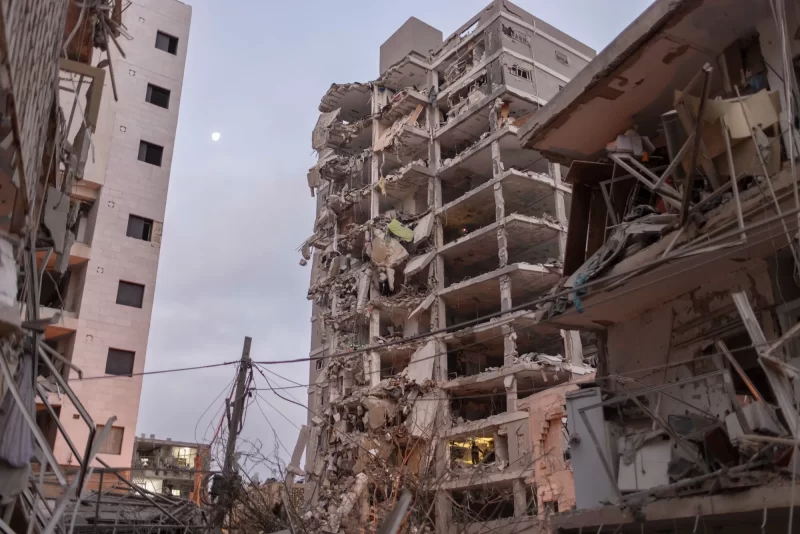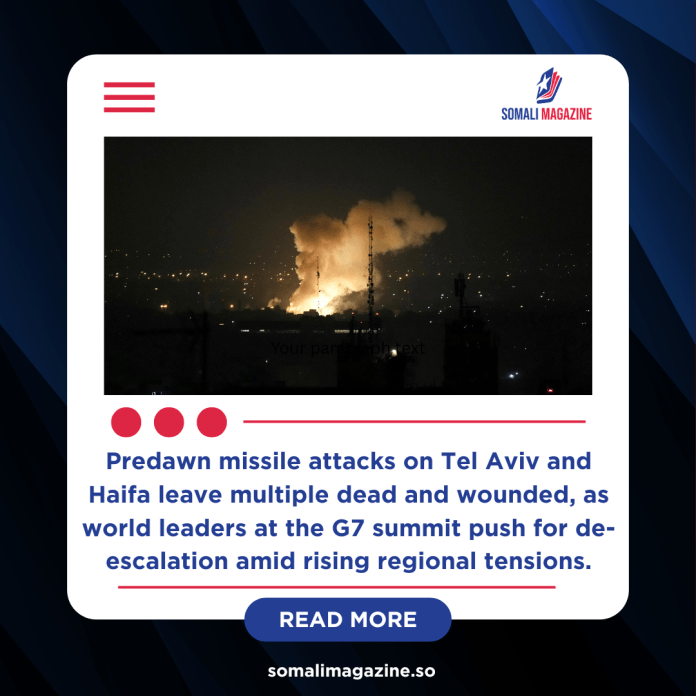Facebook Twitter (X) Instagram Somali Magazine - People's Magazine
Before dawn on Monday, Iran launched missile strikes on the Israeli cities of Tel Aviv and Haifa, destroying homes, injuring over 100 people, and killing at least five. The attacks sparked urgent discussions among global leaders at the G7 summit, where the conflict between Iran and Israel is now a top concern.
The attacks were in retaliation for Israel’s earlier strikes on Iran, which had targeted its nuclear and missile sites and killed senior Iranian military leaders. Since Friday, Israel’s death toll has reached at least 18 people.
In Tel Aviv, several residential buildings were destroyed, including areas near the U.S. Embassy. Although the embassy suffered minor damage, no staff were injured. One resident, Guydo Tetelbaun, described how the door to a public shelter was blown in during the attack and several people were injured. He returned to find his apartment walls collapsed and glass shattered. “It’s terrifying… it could get worse, or better, but it’s the unknown that’s scariest,” he said.

Other parts of central Israel were also hit, including the Shuk HaCarmel market in Tel Aviv, a school in Bnei Brak, and a street in Petah Tikva. Fires were reported at a power plant near Haifa, and emergency services continued search and rescue efforts in the city, where about 30 people were wounded.
Iran’s Revolutionary Guards claimed that the missiles used a new tactic that confused Israel’s defense systems, leading to more successful hits. They said the strikes overcame Israel’s advanced defense technology, despite support from the U.S. and its allies.
Israel did not immediately comment on the missile attacks but has previously admitted that its Iron Dome defense system is not foolproof. On Monday morning, the Israeli military said it had responded by hitting Iranian command centers and military targets.
Iran reported 224 deaths on its side, with the majority being civilians.
Meanwhile, world leaders at the G7 summit in Canada voiced concern about the growing crisis. German Chancellor Friedrich Merz said the summit would focus on preventing Iran from developing nuclear weapons, protecting Israel’s right to defend itself, and avoiding a larger regional war.
U.S. President Donald Trump, before leaving for the summit, said, “I hope there’s going to be a deal… sometimes they have to fight it out,” showing little urgency to stop the fighting but signaling he is open to future diplomacy.
Iran’s President Masoud Pezeshkian told lawmakers on Monday that Iran does not intend to make nuclear weapons, but it will continue its nuclear research for peaceful purposes.
In the U.S., officials said Trump recently blocked an Israeli plan to assassinate Iran’s Supreme Leader Ayatollah Ali Khamenei. When asked about the report, Israeli Prime Minister Netanyahu dismissed it, saying, “We do what we need to do.”
Since Friday, Israel has carried out heavy strikes in Iran, hitting its nuclear sites and killing key military leaders. In response, Iran warned it would “open the gates of hell” in retaliation.
Although the U.S. denied directly participating in the attacks, American forces helped intercept some Iranian missiles headed for Israel. Trump warned Iran not to target U.S. interests and has praised Israel’s actions.
The ongoing violence has pushed oil prices higher, with Brent crude rising by $0.70 to $74.94 a barrel. However, stock and currency markets in Asia have remained relatively stable.
Peace talks between the U.S. and Iran, which were scheduled for last Sunday, have been canceled. Iran stated it will not negotiate while under attack.
As tensions continue to rise, the world watches closely, fearing the conflict could spiral into a much broader regional war.

